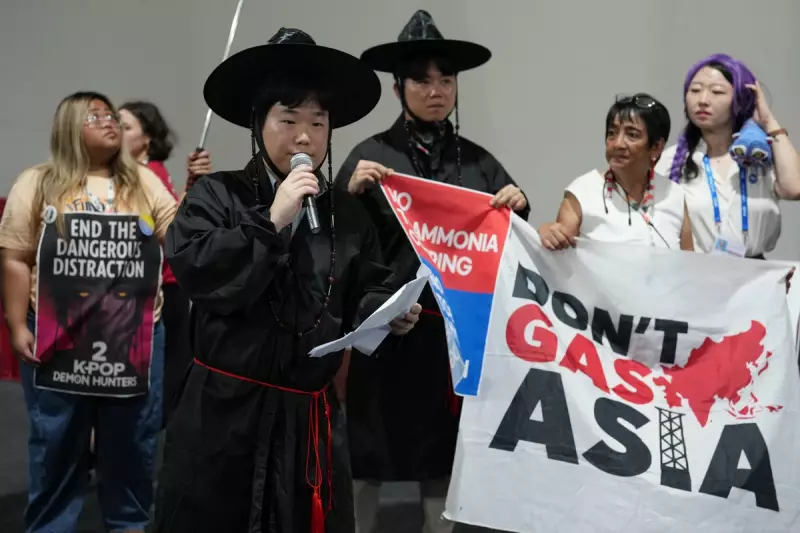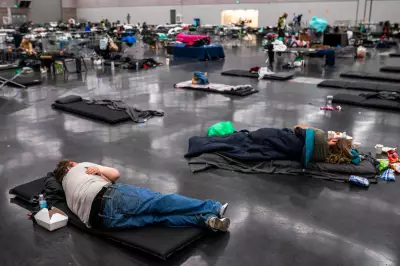
The formidable energy of K-pop fandom, known for propelling the music genre to global stardom, is now being strategically directed towards combating climate change. This new wave of environmental activism has arrived with significant force at the United Nations COP30 climate talks in Belem, Brazil, turning fans into influential climate advocates.
From Online Fandom to Frontline Activism
The push from K-pop enthusiasts has been highly visible throughout the conference, held in a city on the edge of the Brazilian Amazon. Costumed protests against fossil fuel funding featured characters from “KPop Demon Hunters” – the current most-watched film on Netflix with over 325 million views. Beyond the vibrant protests, high-level strategy sessions took place, including panels attended by senior South Korean officials. These discussions focused on a central question: how to effectively mobilise the immense, digitally-connected K-pop fanbase for concrete climate action.
Cheulhong Kim, director of the Korean Cultural Centre in Brazil, a branch of South Korea's Ministry of Culture, Sports and Tourism, highlighted the significance of this shift. "It’s the first time K-pop fans have been introduced on a COP stage — not bands or artists — but fans," Kim stated. "K-pop fans are the real protagonists behind this culture that has the power to shape social and political issues."
A Proven Track Record of Social Impact
This is not the first time the organised power of K-pop fans has been leveraged for social causes. The massive global community has previously rallied to support the U.S. Black Lives Matter movement, successfully pressured Hyundai to cancel a deal with an Indonesian coal plant, and led rallies calling for the impeachment of former President Yoon Suk Yeol.
South Korea's Minister of Climate, Energy and Environment, Kim Seong-hwan, explicitly endorsed this grassroots movement during the talks. While attending a K-pop event at COP30, he told The Associated Press that his ministry "will support K-pop fans and their artists so that K-pop can contribute to tackling the climate crisis."
Confronting South Korea's Climate Contradictions
Activism at the summit directly targeted South Korea's environmental policies. The main hall at COP30 was filled with banners reading "Export K-pop, not fossil fuels," as activists demanded the nation cut its funding for foreign fossil fuel development.
Seokhwan Jeong, who organised the protest with the Seoul-based advocacy group Solutions for Our Climate, cleverly alluded to a storyline from the 'KPop Demon Hunters' movie. He drew a parallel to a character leading a double life, stating, "South Korea must overcome its dual stance — championing coal phase-out on the global stage while supporting fossil-fuel finance behind the scenes. It is time for the country to stop hiding and become a genuine climate champion."
Gyu Tag Lee, a professor at George Mason University Korea who studies K-pop's cultural impact, explained the potency of this organised fan base. "When organised, the fan base is a force to be reckoned with because of its size and intense loyalty." He noted that fans' engagement with social issues is partly driven by direct actions from major bands, such as Blackpink, which filmed video messages supporting climate negotiations at COP26 in 2021.
A Collective Spirit for a Shared Future
Dayeon Lee, a campaigner with KPOP4PLANET, believes that "cultural power is driving real climate action." She articulated the mindset of the movement: "Our love extends beyond artists. We care for each other across fandoms and borders. We are young people facing the same future, fluent in social media, keen to respond to injustice."
This form of K-pop activism aligns perfectly with the Brazilian Portuguese concept of "mutirão" – a spirit of collective effort – which the COP30 Presidency has adopted as a rallying cry. According to Vinicius Gurtler, general coordinator for international affairs in Brazil’s Ministry of Culture, this synergy is powerful. More than 80 countries have voiced support for the "mutirão" call, which environmentalists believe "could be the turning point of COP30."
Gurtler emphasised the role of youth and culture, stating, "One of the best ways for us to do this is through music and through the youth. I don’t think that we will create a better planet if we cannot sing and if we cannot imagine a better world."
As the talks continue, the integration of pop culture and climate advocacy signals a new, dynamic front in the global effort to address the environmental crisis, proving that the power of fandom can extend far beyond the concert hall and into the halls of international diplomacy.





